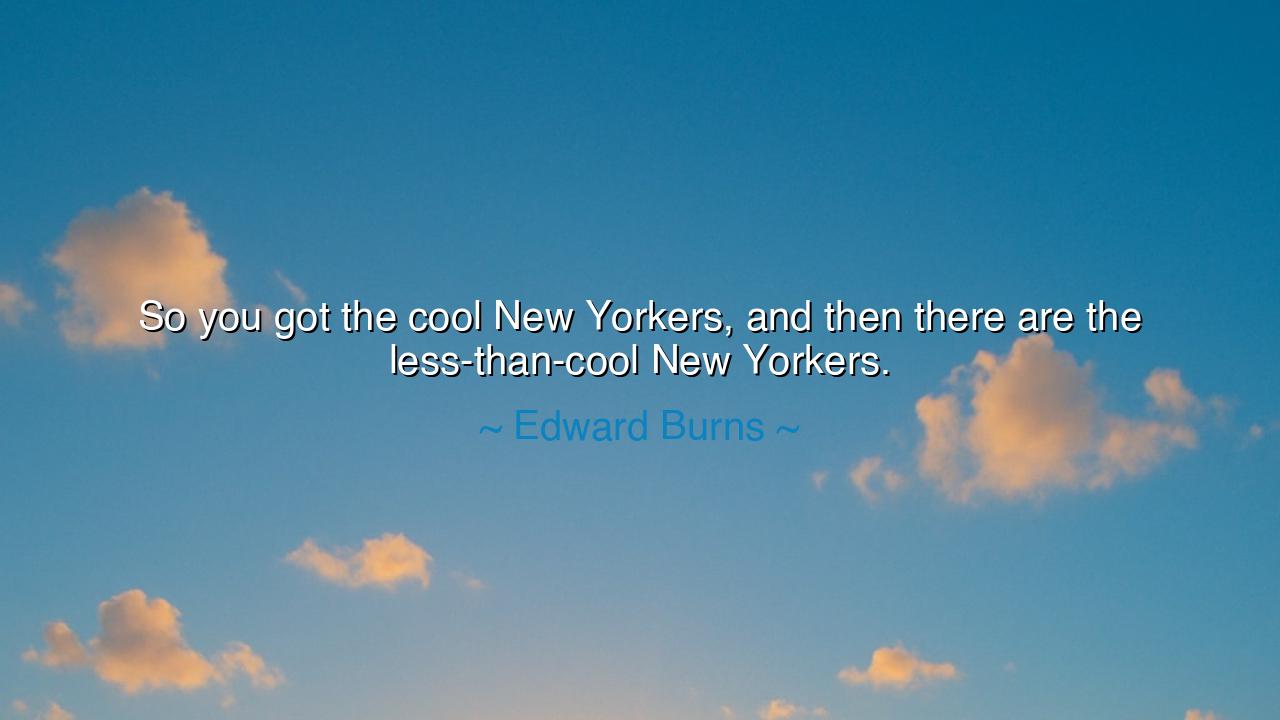
So you got the cool New Yorkers, and then there are the






In the ever-shifting mosaic of human society, there are those who stand out, whose personalities, actions, and presence seem to define the cultural landscape, while others, though equally valuable, might not immediately demand the same attention. Edward Burns’ words, "So you got the cool New Yorkers, and then there are the less-than-cool New Yorkers," speak to the subtle but powerful dynamics of identity, perception, and social positioning. It is a recognition that within any community, from the bustling streets of New York to the most distant villages, there are individuals who embody the cultural ideal—those who seem to be the very essence of what society deems worthy—and those who fall outside that defined mold, often relegated to the shadows, despite their inherent worth.
In the ancient world, this division of the "cool" from the "less-than-cool" was perhaps most clearly illustrated in the structure of Greek city-states. In Athens, for example, the philosophers, orators, and political leaders like Pericles and Socrates were the elites—the ones whose actions and ideas were deemed vital to the success and prestige of the city. The common people, though equally important in the city's operations, were often overshadowed by the intellectual elite. Yet, the true wisdom of Athenian democracy lay in its recognition that every individual had a role to play in the flourishing of the society, even if some were more celebrated than others. Burns’ reflection on the New Yorkers points to a similar truth: while some individuals and their actions might capture the public’s attention, we must not forget that every person has intrinsic value and contributes to the vibrancy of a society.
Similarly, in Rome, there were those who stood at the top, like the Emperors and senators, and those who toiled in the background, performing the vital tasks that allowed the empire to thrive. Gladiators, for example, though celebrated in the arena, were often seen as little more than mere tools for entertainment. Yet, through their bravery and sacrifice, they became the stuff of legend. Much like the "cool" New Yorkers Burns mentions, these figures had their place in the public eye, but their worth was not defined solely by their societal standing. True worth, as the ancients understood, is not determined by public acclaim but by personal contribution and integrity.
The lesson here, then, is that societal definitions of coolness or prestige are often fleeting and superficial, rooted in the ever-changing perceptions of the time. In modern society, as in ancient Greece and Rome, there will always be those who are celebrated for their charisma, power, or influence. But true virtue and greatness are not necessarily tied to public opinion. Socrates himself, despite being one of the greatest thinkers of his time, was not always regarded as a figure of prestige by the masses. In fact, he was sentenced to death by the very city he helped shape. Yet, history remembers him not for his public popularity, but for his enduring wisdom and the way he shaped the future of philosophy.
Take, for example, the story of David and Goliath. While Goliath, the towering warrior, was the embodiment of what the people of Israel might have considered "cool"—a man of strength, stature, and power—it was the humble shepherd David who, though seen as less-than-cool, triumphed. David’s victory over Goliath was not just a physical one, but a symbolic victory over the prevailing notions of what society valued. The real lesson of this story lies in the recognition that greatness can come from the unexpected and that true worth often lies in qualities that are not immediately visible or recognized by society at large.
The ancient sages knew that society’s view of who was "cool" or "worthy" was often misguided, shaped more by appearance and public favor than by true virtue. The Buddha taught that to understand life, one must look beyond the surface—beyond the superficial judgments and illusions of status. He challenged his followers to see the true nature of things, not just how they are perceived by others. In the same way, Burns’ quote challenges us to recognize that worth is not measured by who is labeled "cool" by the world, but by the deeper contributions each individual makes to the greater good.
In practical terms, the lesson is clear: do not seek validation from the world’s shallow definitions of "coolness." Rather, seek to cultivate your own virtue, your own character, and let your actions speak for themselves. Everyone has a role to play, and each contribution—no matter how small or unnoticed—builds toward the collective strength of society. Whether you are in the spotlight or not, your worth is not determined by public approval, but by the authenticity and integrity of your actions. Let this be a reminder that while society may place value on the visible and the celebrated, the true heroes often emerge in the quiet, unnoticed places, their contributions shaping the world in ways the world might never fully understand.






AAdministratorAdministrator
Welcome, honored guests. Please leave a comment, we will respond soon